#Battle Of Shrewsbury
Text
Henry’s first battle may have had lasting effects which went beyond those of a very severe, and no doubt very traumatic, physical injury. There may have been lasting neurological damage. His potentially fatal wounding, and near escape from death, at Shrewsbury in July 1403 may have had longer-term effects. That closeness to mortality may have made him more than normally aware, for his time, of his state of health. The high risks involved in campaigning, not only of death in battle, may have led him to make three wills, each on the eve of his departure to France. It was, after all, of illness on campaign, not from ‘active service’, that he was to die.
Malcolm Vale, Henry V: The Conscience of a King (Yale University Press, 2016)
#henry v#shrewsbury wound#the death of henry v#battle of shrewsbury#historian: malcolm vale#henry v's health
12 notes
·
View notes
Text
Really enjoyed watching Dan Jones and Michael Livingston do a documentary on the Battle of Shrewsbury - You can watch it on History Hit - https://access.historyhit.com/what-s-new/videos/battle-of-shrewsbury - use the code WINTERSALE to get their service at £1/month for 3 months
#battle of shrewsbury#medieval military history#medieval warfare#english history#henry iv#History Hit#history documentary
6 notes
·
View notes
Text

The King (2019)
#2019#film#movie#The King#Timothee Chalamet#Prince Hal#Hal#King Henry V#Tom Glynn-Carney#Sir Henry Percy#Harry Hotspur#Hotspur#Joel Edgerton#John Falstaff#Robert Pattinson#The Dauphin#Battle Of Shrewsbury#Battle Of Agincourt#Hundred Years' War#England#France#knights
5 notes
·
View notes
Text
Some more thoughts about Henry V’s face hole
I tracked down an 1898 article, “Some Documents Relative to the Battle of Shrewsbury” (Transactions of the Shropshire Archaeological and Natural Society, 2nd series, vol. x, part ii). Very luckily, the society still exists and has pdfs of all their past volumes of their journal on their website (I’m not going to link because of tumblr gets mad about links but it’s easy to find via Google - though if you’re looking for this article, it’s listed as vol. 21, part 2). Anyway, I wanted this article because Michael Livingston mentions in on his chapter on the treatment of Henry V’s facehole in Wounds and Wound Repair in Medieval Europe) that it contains the only surviving reference, albeit an indirect one, that Henry IV made about the wound. More interesting, however, this isn’t the only mention made of the then-Prince Henry (who I’ll call Hal in this post).
Here’s the reference Livingston noted:
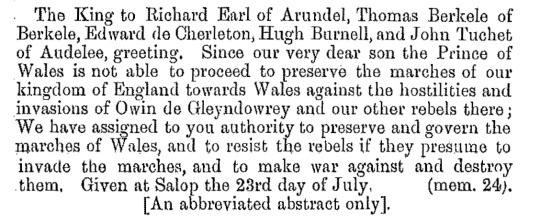
[transcript: The King to Richard, Earl of Arundel, Thomas Berkele of Berkele, Edward de Cherleton, Hugh Burnell, and John Tuchet of Audelee, greeting. Since our very dear son the Prince is not able to proceed to preserve the marches of our kingdom of England towards Wales against the hostilities and invasions of Owin de Gleyndowrey and our other rebels there; We have assigned to you authority to preserve and govern the marches of Wales, and to resist the rebels if they presume to invade the marches, to make war against and destroy them. Given at Salop the 23rd day of July. (mem. 24)]
Livingston says that this was written twenty days after the Battle of Shrewsbury, the date given in the article is only two days after the battle, I’m not sure what the truth is (I’m guessing Livingston checked the original record? “Salop” seems to an alternate name for Shrewsbury so it would make the most sense for it to be within days of the battle). It’s only an oblique reference to Hal’s injury, saying that he’s not able to perform his duties (unsurprisingly!) but without explanation and giving the responsibility for his duties to others.
But there’s a record of an announcement made by Henry, this time referencing an order to Hal, a couple of days later:
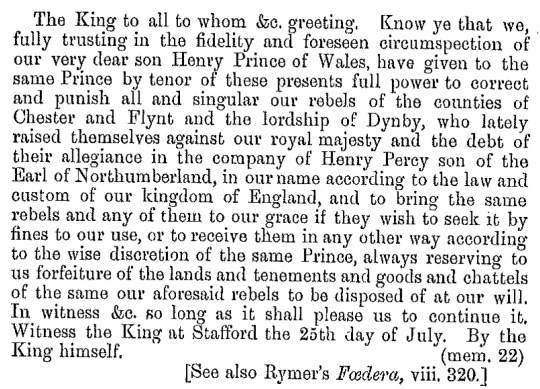
[transcript: The King to all to whom &c. greeting. Know ye that we, fully trusting in the fidelity and foreseen circumspection of our very dear son Henry Prince of Wales, have given to the same Prince by tenor of these presents full power to correct and punish all and singular our rebels of the counties of Chester and Flynt and the lordship of Dynby, who lately raised themselves against our royal majesty and the debt of their allegiance in the company of Henry Percy son of the Earl of Northumberland, in our name according to the law and custom of our kingdom of England, to bring the same rebels and any of them to our grace if they wish to seek it by fines to our use, or to receive them in any other way according to the wise discretion of the same Prince, always reserving to us forfeiture of the lands and tenements and goods and chattels of the same our aforesaid rebels to be disposed of at our will. In witness &c. so long as it please us to continue it. Witness the King at Stafford the 25th day of July. By the King himself. (mem. 22)]
The same order on the same date is also present in Rymer’s Foedera, vol. 8, p. 320.
So. We have Henry IV, four days after the battle, giving Hal the power and responsibility to deal with rebels, to use his “wise discretion”, whether to correct and punish them or to facilitate a reconciliation between them and Henry. The only person given the responsibility is Hal, with no reference to other people who could fulfil these duties. Henry, your son has got a bodkin point lodged six inches deep in his skull. I don’t think he’s capable of “wise discretion” right now.
The next reference is a grant to Hal of seized goods:
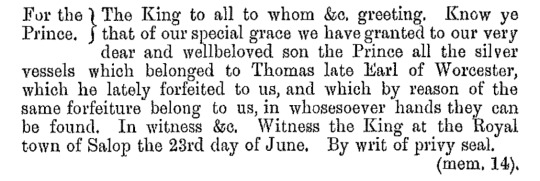
[transcript: For the Prince: The King to all to whom &c. greeting. Know ye that of our special grace we have granted to our very dear and wellbeloved son the Prince all the silver vessels which belonged to Thomas late Earl of Worcester, which he lately forfeited to us, and which by reason of the same forfeiture belong to us, in whosesoever hands they can be found. In witness &c. Witness the King at the Royal town of Salop the 23rd day of June. By writ of privy seal. (mem. 14)]
This is a more sensible move, since it doesn’t require the sixteen-year-old with the arrow in his head to do anything. The date given is 23 June but that’s probably a mistake for 23 July, as it would predate the battle where Worcester died. But before we give Henry too much credit, here’s another “um, dude, your son has got an arrowhead lodged in his skull...”

[transcript: The King assigns to Henry Prince of Wales power to enquire into the cases of and treat with those who took part in the late rebellion, viz. Richard de Wenyngton chivaler, Adam Bostok, John Donn of Ulkyngton, John Kynglesley, Thomas Holford, John de Legh of Bothus, Richard Chalmesley, Robert Goldsmyth of Chester, Thomas Sparkes of Chester, Roger de Venables parson of the church of Ronsthorne, Roger Davenport parson of the church of Pulforde, William de Clotton parson of the church of Dodleston, the parson of the church of Hanley and William de Legh formerly parson of the church of Davenham, and all other ecclesiastics who came armed to the battle near Salop or assented to the said rebellion, with a view to their pardon and restoration of their forfeited goods. Given at Westminster 27 September. (mem. 7)]
(Before I get into it, that’s a lot of priests who fought or at least took part in the rebellion!)
Once again Henry is assigning to Hal the duty of dealing with the rebels though the date is two months after the battle. It’s possible that the arrowhead was out at this stage - John Bradmore doesn’t specify how long it took him to devise and enact his treatment, or when it ended. But his account indicates that significant time had passed between the failed attempts of "diverse skilled doctors” to treat the wound and his arrival on the scene (”at length I came to him”), though this might be rhetoric to make himself sound more skilled. He doesn’t also detail how long it took him to devise his treatment, design and make the surgical instrument he used or how long it it took to enlarge the wound or remove the arrowhead, or the aftercare beyond twenty days of wound-packing. Anne Curry does note that Hal was out of action for about a year after the injury which certainly implies that recovery took a long time. But whether Bradmore had completed his cure by late September or his treatment was still in progress, I doubt Hal was in much of a state to do anything in response to this order.
So.
I think these orders were about maintaining the image that all is well, that the Prince of Wales is in good health and actively engaged in the running of the kingdom. I think there was probably verbal messages sent to ensure that these duties were attended to by someone who was discreet and fit for the job - perhaps someone like Richard, Earl of Arundel (who, per the first order, was already dealing with Glyn Dwr’s rebellion) or perhaps even Edward, Duke of York (who was appointed in October that year as lieutenant of south Wales), or someone in Hal’s household - while presenting outwardly the fiction that Hal was involved.
The relative silence around Hal’s wound, the contradiction between the seriousness of the wound as described by Bradmore and the short, unelaborated mentions of it in contemporary accounts and, in these records, the reports of duties still be carried out by Hal in the immediate aftermath of the battle, all suggest that there was significant anxiety around the wound. Henry IV no doubt feared for his son’s life and long term health. But the wound could also be “read” as judgement on Henry’s reign and on his claim to the throne. To lose no less than the heir to the throne just years into his reign, in a battle that contested the legitimacy of Henry’s kingship and had been very close and very deadly, was probably not something that could be viewed neutrally. It may have also been read as potentially disastrous in view of the Owain Glyn Dwr’s rebellion. Glyn Dwr had declared himself Prince of Wales and the English Prince of Wales had been struck down with an arrow wound, left fighting for his life, suggesting that perhaps Glyn Dwr was in the right. Therefore, it was something best hushed up, best ignored.
There is no evidence of Henry visiting Kenilworth and although he must have been kept informed, no evidence of communication about Hal’s condition has survived, perhaps suggesting that perhaps any updates on his son’s conditions were either delivered verbally or were destroyed after being read. Although, that could just be a quirk of what survives and what doesn’t. At the same time, there seems to have been no urgent move to recall Henry’s second son, Thomas, from Ireland, with the view that if Hal died, Thomas could be immediately promoted to Prince of Wales and take over in Wales or that he would need to see his brother or attend his funeral. Thomas did return in November 1403 due to the dire condition of his regime in Ireland (letters dating back to 1402 attest to his struggles) but it’s also tempting to speculate that Hal’s injury may have played a role with Thomas returning either to see his brother before he died or in preparation to become the Prince of Wales. This was four months after the battle, however, so Hal may well have been out of danger by this stage and Thomas’s return may have been no more than coincidental.
So. I think these orders to Hal by Henry were part of maintaining the fiction that all was well. The first one came on the heels of battle, perhaps even as Hal was being moved from Shrewsbury to Kenilworth for treatment. We don’t know how long Bradmore took to tend to the wound but it’s tempting to speculate that this second order may have come at a time when it was unclear whether Hal would recover from Bradmore’s treatment or what his recovery would look like - or, perhaps, in response to gossip or rumours about the Prince of Wales’s health that have not survived.
#henry v's face hole#henry v#henry iv#thomas duke of clarence#battle of shrewsbury#text posts#the henry v novels
8 notes
·
View notes
Text
21st July
The Battle of Shrewsbury

Death of Henry “Harry Hotspur” Percy by Richard Caton Woodville Jnr (1910). Source: Wikipedia
On this day in 1403, the battle of Shrewsbury took place. The battle was the climax of a full blown rebellion against King Henry IV, led by Henry ‘Hotspur’ Percy, eldest son of the Earl of Northumberland. The Percies were the leading aristocratic family in the north of England and were able to raise a considerable force to challenge the king. The dispute hinged on a large loan the Percies had made to Henry IV which he had failed to repay, but there was also some hankering among those who followed Hotspur for a return of the deposed and imprisoned King Richard II, who unknown to many, had been murdered three years before. The king’s army was at least theoretically led by the sixteen year old Prince Harry, son of the king and the future Henry V. Shakespeare’s account of the battle in Henry IV Part I indulges in much poetic license, but the rebels were indeed defeated and Hotspur killed, even if not personally at the hands of the precocious prince as depicted in the play.
The bells of Battlefield Church, built soon after the contest in Customs, allegedly offer some rather belated tactical advice. ‘Hold up your shields, say the bells of Battlefield’, they chime helpfully.
0 notes
Text
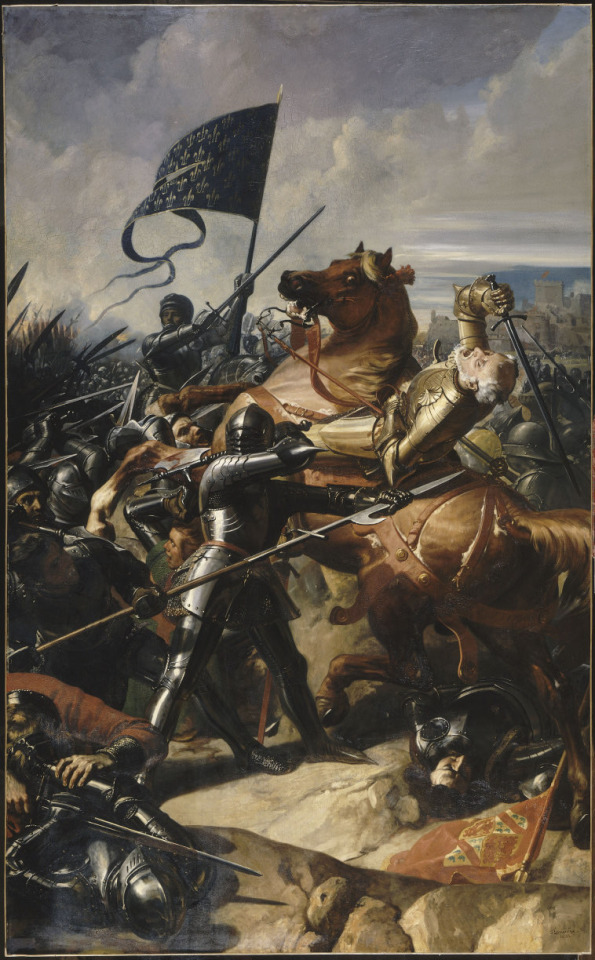
The Battle of Castillon, 17 July, 1453 by Charles-Philippe Larivière
Depicting the death of John Talbot, Earl of Shrewsbury falling from his wounded horse.
#charles philippe larivière#battle of castillon#art#john talbot earl of shrewsbury#john talbot#death#hundred years war#knights#medieval#middle ages#england#france#history#gascony#europe#european#armour#knight#battle#the hundred years war#earl of shrewsbury#galerie des batailles#palace of versailles#château de versailles
125 notes
·
View notes
Text
i love the way henry iv in david giles' production was dressed. wicked slay cunt.
#i let a little bostonian get into me w that wicked but it felt right#tales from diana#i have the right to use new england slang words i live here#not only his headwraps but his gloves with those glamorous rings on top. im sorry but serve? maam?#i do like how they made his dress resemble henry iv's real portraits. and just the fact that jon finch resembles him very well!#in face. that's very satisfying#i remember when ben whatsisface played octavius caesar in the 2017(?) production of antony and cleopatra#i could've shit he looks JUST like the marble bust of augustus. i think i made a post about it one of the times i watched it#ofc you can cast whoever you want if youre a director but when the actor does look like the real historical figure. it makes my brain go br#david gwillim looks reasonably like henry v too & i like that they gave him the facial scar after the battle of shrewsbury#honestly henry v's never-to-be-seen facial scar from that battle is the only thing i find thoroughly interesting about him. the real henry#not the shakespearean version. prince hal i find plenty compelling#but the fact that his only portraits as an adult are taken from a completely side-facing angle. it begs the question!#diana the historical portrait nerd...#text post#shakespeare#henry iv#david giles#if i had a higher quality of the productions to watch id take screenshots but since the bbc television shakespeare#seems to only be available to stream in doody quality everywhere... eh what's the point
1 note
·
View note
Text

Battle of Castillon, July 17, 1453, Charles-Philippe Larivière, 1839
At the Battle of Castillon, the last major clash of the Hundred Years War, English forces under John Talbot, Earl of Shrewsbury, were cut to pieces by massed French artillery. Talbot and his son were both slain. This painting depicts the moment of Talbot's death (inaccurately--in fact he was unarmored, due to a vow he had taken several years before).
#art#art history#Charles-Philippe Lariviere#historical painting#Middle Ages#medieval#medieval history#Hundred Years War#French art#19th century art#oil on canvas#Versailles#Palace of Versailles#death tw
276 notes
·
View notes
Text
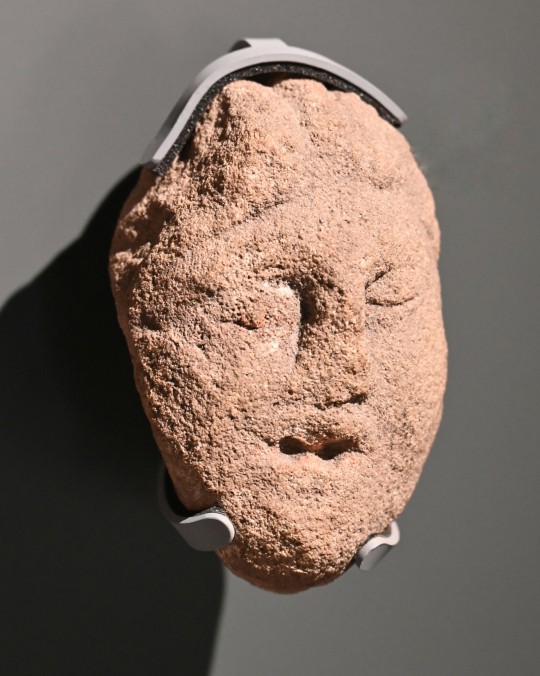
Stone Carved Trophy Head Of A Warrior Taken In Battle, 2nd Century CE, Wroxeter Roman City, Shrewsbury, Shropshire
#stone head#trophy#battle trophy#iron age#stone carving#archaeology#relic#ritual#symbols#ancient craft#ancient cultures#ancient living#Wroxeter#roman living#roman empire#roman art
46 notes
·
View notes
Text
[Henry V's] experience of battle at Shrewsbury might also have made Henry especially conscious of the plight of those who suffered in war. In November 1413, for example, he granted Thomas Huntley and his wife Agnes a pension of 8d per day for the term of their lives, drawn on revenues in Essex and Hertfordshire. Thomas had, like the king himself, been wounded at Shrewsbury and ‘could not earn his living, nor did he have anything on which to live, as it is said’. Later in the reign, the king had made provision for those left wounded and deprived of sufficient means by their service in his French war. Shortly after his death, it was recorded that he had given sums of money ‘at various times’ to ‘certain soldiers, wounded [mutulatis] in the king’s service, and reduced to poverty through the weakness of their bodies’.His executors discharged their duties and cleared the debts thus incurred. Les Invalides (founded in 1670) and Chelsea Hospital (founded in 1682) clearly had precedents, if less institutionalised ones.
Malcolm Vale, Henry V: The Conscience of a King (Yale University Press, 2016)
8 notes
·
View notes
Text
Last Updated: 2024-02-02

Disclaimer: I am not the author of these stories, just sharing my favourite Prince Hal/Henry V stories. Find the authors' links below. If you want your work removed, message me privately.
Legend: 〔E〕 ⇢ Erotic/Steamy | 〔F〕 ⇢ Fluff | 〔A〕 ⇢ Angst/Hurt 〔M〕 ⇢ Minor Angst/Hurt | 〔C〕 ⇢ Comfort | ♥︎ ⇢ Established Relationship | 𑁍 ⇢ Pregnancy/Children | 🚫 ⇢ Content Warning

✠ Claimed│Prt. II│Prt. III by yespolkadotkitty • 18+ • 〔E᜶M〕 • 🚫 •
Summary: When an unknown man claims ownership of your home, you determine the best course of action is to gain his favour by using your feminine wiles.

✠ Arise Fair Sun by smolvenger • 〔F〕 •
Summary: "One night, Henry appears under your balcony to confess his feelings to you."
✠ Army of King Henry V, the by frostbitten-written • 18+ • 〔E᜶C〕 • ♥︎ •
Summary: "King Henry V will be departing for battle on the morrow. He and his queen share one last night of passion, with hopes of conceiving"
✠ Her Prince│Prt. II by omgrachwrites • 〔F᜶A〕 •
Summary: "The man that comes to visit you at your woodland cottage —the man that you're falling in love with —is a mystery. When you discover what he's hiding from you, it turns your... world upside down."
✠ Nursing the Prince by smolvenger • 〔F〕 •
Summary: "You tend to Prince Hal's wounds after the Battle of Shrewsbury."
✠ Prince and the Servant, the│Prt. II by angelkurenai • 〔F〕 •
Summary:
✠ Queen's Abduction, the by smolvenger • 16+ • 〔A᜶C〕 • 🚫 •
Summary: "Shortly after your secret marriage to the king of England, Henry V, a nefarious villain abducts you to be his..."
✠ Second Floor, the by shiningloki • 18+ • 〔E᜶F〕 • ♥︎ •
Summary: "Prince Hal has been visiting the ale house for as long as he could remember. He met you there —a woman employed by the tavern to pleasure its customers. After taking you for the night, Hal [demands you] be reserved for his personal use only... Six months later, Hal [returns after leaving for war three weeks early] later to indulge in [you], but this time, he has come with a shocking revelation."
✠ Shy by high-functioning-lokipath • 〔F〕 •
Summary: "[Like] many nights, Hal finds himself in the Eastcheap taverns… [However,] this night, he notices something different — or rather, someone. Blending into the background... [you keep your] head down... as [you clean] up... occasionally [you glance] their way, meeting his eyes a few times but never lingering in his gaze. [So] as any cocky, self-assured Prince would do, he saunters over to [you], his head held high... with a charming smirk painted on his lips."
✠ Tavern Prince by smolvenger • 〔F〕 •
Summary: "You are shocked and unhappy to find out you are betrothed to notorious rake, Prince Hal. But one evening, he sneaks you into the Boar's Head Tavern... and your mind about him starts to change."
✠ Used Goods│Prt. II by smolvenger • 〔F᜶A〕 • ♥︎ • 🚫 •
Summary: "While betrothed to... Hal. But The Law of Contract states that you must be a virgin to marry into royalty. You are not; you didn't choose to...and to escape arrest and treason, you must seek the Prince and tell him your dark secret of being sexually abused as a child. Is the betrothal over? How will Hal react?"
✠ Wedding of the King, the by smolvenger • 16+ • 〔F᜶C〕 • 🚫 •
Summary: "Henry consents to an arranged marriage to [you, a noble woman]. He is enthusiastic about [the marriage] upon meeting [you]. [Nevertheless,] as the wedding day arrives, he learns that [you are] not."
✠ Wordless by megthemewlingquim • 18+ • 〔E〕 • ♥︎ •
Summary:
✠ You Will Be Mine by five-miles-over • 〔E〕 • 🚫 •
Summary: Hal takes a special interest in one of the palace servants.

✠ Beautiful by angelkurenai • 〔F〕 •
✠ Beautiful as Always by lady-rose-moon • 18+ • 〔E〕 • ♥︎ •
✠ Fairytale by five-miles-over • 〔F〕 •
✠ Fight by angelkurenai • 〔F〕 • ♥︎ • 𑁍 •
✠ His Queen by smolvenger • 〔F〕 • ♥︎ •
✠ Prince Charming by jewels2876 • 〔F〕 •
✠ Shamless by megthemewlingquim • 18+ • 〔C〕 • ♥︎ •
✠ Waking Through the Forest by high-functioning-lokipath • 〔F〕 • ♥︎ •

See Also: Navigation || Prince Hal/Henry V Master Index
See Also: @angelkurenai || @five-miles-over || @frostbitten-written || @high-functioning-lokipath || @jewels2876 || @lady-rose-moon || @megthemewlingquim || @omgrachwrites || @shiningloki || @smolvenger || @yespolkadotkitty ||
#Prince Hal x Reader#Prince Hal x Y/N#Prince Hal x You#Henry V x Reader#Henry V x Y/N#Henry V x You#Tom Hiddleston x Reader#Tom Hiddleston x Female Reader#Tom Hiddleston x Y/N#Tom Hiddleston x You#The Hollow Crown Fanfiction#The Hollow Crown Fanfic#Tom Hiddleston Fanfiction#Tom Hiddleston Fanfic
32 notes
·
View notes
Text
Henry V Masterlist

A collection of all the works I have written about Henry V or Prince Hal!
*= Smut
Used Goods- Prince Hal x Reader.
Why does he have to be The Prince of Wales? Why couldn’t he be just a tailor?
You are betrothed to your darling prince Hal, but the Law of Contract demands that you must be a virgin to marry the future King of England. This forces you to confirm a traumatic incident and secret from your past...how will Hal react? TW: Discussions of past sexual assault,"Who did this to you?", Hurt/Comfort, and comforting fluff.
Part One// Part Two
The Twelve Days- Prince Hal x Reader.
“You, luckiest of girls, are betrothed to marry none other than the King of England!” your mother cheered.
You were betrothed to marry none other than the young kind of England, a man you had never met. Now you must face your first celebration of the Twelve Days of Christmas not only as a queen but as a wife in a royal and still unconsummated marriage... TW: Check individual chapters, Smut in certain chapters, only a little angst, and lots of fluffy and romantic moments.
(Now Complete!)
One//Two*//Three*//Four//Five//Six//Seven*//Eight
The Wedding of The King- Henry V x fem! Reader
As king, Henry could have anything...But he could not have a wife who loved him.
Henry is looking forward to the wedding of his arranged marriage to you. You as The Bride, however, are not... (In The Twelve Days Universe but can be read without that context)
Nursing The Prince- Prince Hal x fem! Reader
"You look at the prince like he was a honey-cake!"
You tend to Prince Hal's wounds after the Battle of Shrewsbury.
Arise Fair Sun- Henry V x fem! Reader
"Here, there are no eyes watching us. I can speak to you honestly"y.
One night, Henry appears under your balcony to confess his feelings to you.
The Battle of Agincourt*- Coming soon!
"I have so much shame, so much regret…but you- you were the best choice I made as king. To choose to marry you, love you."
You follow your husband, Henry the Fifth, on his quest to battle against France for lands under his claim. It is the morning before the decisive battle of Agincourt. With the risk he might be killed in battle, you spend a possible last morning together. tw: SMUT, also discussions of death and war, some angst but also some romantic fluff.
Taglist: @4stary @sonyascomet @evelyn-kingsley @five-miles-over @jennyggggrrr @fictive-sl0th @ladycamillewrites @villainousshakespeare @holdmytesseract @eleniblue @twhxhck @lokisgoodgirl @lovelysizzlingbluebird @raqnarokr @holymultiplefandomsbatman @michelleleewise @villainousshakespeare @holdmytesseract @wolfsmom1 @eleniblue @muddyorbsblr @sidepartskinnyjeans
REBLOGS, COMMENTS, DMS, AND ASKS ABOUT MY WORK ARE APPRECIATED! THANK YOU!!! If anyone wants to be added to the taglist or removed, please let me know! Thanks y'all!
#smut#tom hiddleston#the hollow crown#prince hal#henry v#prince hal x you#prince hal x reader#prince hal x fem! reader#prince hal x y/n#prince hal x fem! y/n#henry v x y/n#henry v x fem! y/n#henry v x you#arranged marriage au#medieval au#historical au#tom hiddleston imagine#tom hiddleston characters#carrie writes#fluff#historic fiction#history#tom hiddleston characters fluff#prince hal smut#henry v smut#the holllow crown smut#tom hiddleston smut#tom hiddleston characters smut#tom hiddleston fluff#tom hiddleston fanfiction
64 notes
·
View notes
Text
King Henry V was shot in the face with an arrow. Amazingly, not only did he survive being hit, but his surgeon managed to safely remove the arrow.
33 notes
·
View notes
Text

Battle of Castillon by Ugo Pinson
#battle of castillon#hundred years war#the hundred years war#england#france#english#french#medieval#middle ages#knights#armour#john talbot#art#painting#history#europe#european#john talbot earl of shrewsbury#talbot#kingdom of england#kingdom of france#gascony#aquitaine#ugo pinson#plume#helmet
208 notes
·
View notes
Text


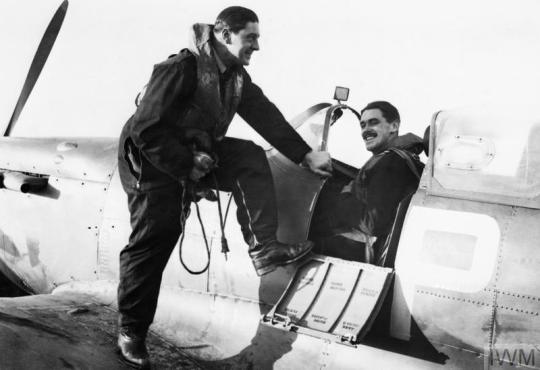
Harbourne Mackay Stephen was born in Elgin on 18th April 1914.
Harbourne was the son of a bank manager. He was initially educated privately, but then went to schools in Edinburgh and later at Shrewsbury School in Shropshire. He finished his schooling when he was 15-years-old and soon afterwards shifted to London to work in the newspaper industry. His first job was copy boy with Allied Newspapers and later he moved to the advertisement staff of the Evening Standard.
Stephen joined the Royal Air Force Volunteer Reserve in April 1937 as an and learned to fly. Having achieved the required standard and number of flying hours, Stephen was offered the chance to train with the regular RAF for six months and was given six months leave of absence from his job.
He was offered a full Commission in April 1940 Stephen was posted to 74 Squadron at Hornchurch Over Dunkirk on 24th May he shared in destroying several German aircraft.
Pilot Officer Stephen shot down his first German plane on July 28 1940, and in the next 14 days he shot down 11 more. His score of eight victories in one day came on August 11th when he destroyed three Me109s and two Me110s, probably destroying another and damaging two more. He was awarded the Distinguished Flying Cross.
Flying Spitfires with 605 squadron he took part in the air battles over France and Dunkirk and throughout the thick of the Battle of Britain. He was one of the top scoring R.A.F. pilots at the end of 1940 with 22 and a half air victories
Harbourne Mackay Stephen was the first airman to be awarded a DSO, )Distinguished Service Order)in the field As one of the ''Tigers'' (74 Squadron) he shared the honour of shooting down the 600th aircraft to be destroyed by fighters from a single RAF. After the Battle of Britain, Stephen was posted to Turnhouse , Edinburgh as Chief Flying Instructor; but this was not his idea of active service, and he soon volunteered to go to the Far East in 1942 where he took command of 166 wing, remaining in fighters until the end of the war.
After the war he had a successful career in newspapers where he became managing Director of the Daily Telegraph and Sunday Telegraph. He died on 20th August 2001.
8 notes
·
View notes
Text
As the victor at the Battle of Bosworth, in fact, Henry VII would have had special reason to honour the Virgin and adopt her symbol of the rose, for it was during the octave of the Assumption of the Virgin from 15 August to 22 August in 1485 that his fortunes turned so dramatically after his fourteen years of exile in Brittany. It was within that eight-day period that vital supporters joined his forces as he made his way across Wales, entered England near Shrewsbury, and advanced south-eastward to his victory at Bosworth Field. On 22 August, the final day of the octave, the crown was his.
— Virginia K. Henderson, Retrieving the "Crown in the Hawthorn Bush": The Origins of The Badges of Henry VII | Traditions and transformations in late medieval England
To judge by the several documents that record Henry Tudor's presence at mass while he was in exile in Vannes, all of which occurred on the feast days of the Virgin, he appears to have been devoted to her prior to his entry into England. That would not have been unusual in Brittany, however, where devotion to the fiercely debated concept of the Immaculate Conception was especially strong in the fifteenth century and where undoubtedly, as has been argued elsewhere, the future king was under the tutelage of the Observant Franciscans, who were ardent supporters of the Virgin and her immaculacy.
12 notes
·
View notes